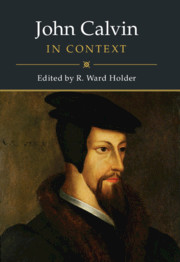Book contents
- John Calvin in Context
- John Calvin in Context
- Copyright page
- Dedication
- Contents
- Contributors
- Acknowledgments
- Abbreviations
- Introduction
- Part I France and Its Influence
- Part II Switzerland, Southern Germany, and Geneva
- Part III Empire and Society
- Part IV The Religious Question
- Part V Calvin’s Influences
- 34 Calvin and Luther
- 35 Calvin and Melanchthon
- 36 Calvin and the Swiss and South German Evangelicals
- 37 Calvin’s Friends
- 38 Calvin’s Critics
- 39 Calvin’s Lutheran Critics
- 40 Calvin’s Catholic Critics
- 41 Calvin and the Anabaptists
- Part VI Calvin’s Reception
- Conclusion
- Bibliography
- Index
- References
41 - Calvin and the Anabaptists
from Part V - Calvin’s Influences
Published online by Cambridge University Press: 14 November 2019
- John Calvin in Context
- John Calvin in Context
- Copyright page
- Dedication
- Contents
- Contributors
- Acknowledgments
- Abbreviations
- Introduction
- Part I France and Its Influence
- Part II Switzerland, Southern Germany, and Geneva
- Part III Empire and Society
- Part IV The Religious Question
- Part V Calvin’s Influences
- 34 Calvin and Luther
- 35 Calvin and Melanchthon
- 36 Calvin and the Swiss and South German Evangelicals
- 37 Calvin’s Friends
- 38 Calvin’s Critics
- 39 Calvin’s Lutheran Critics
- 40 Calvin’s Catholic Critics
- 41 Calvin and the Anabaptists
- Part VI Calvin’s Reception
- Conclusion
- Bibliography
- Index
- References
Summary
The unhappy encounter between Anabaptists and Reformed in Wismar in 1553 is a striking example of how confusing the sixteenth-century religious landscape was. In the early 1550s a group of Anabaptists under the leadership of Menno Simons managed to live peacefully in the small German Hanseatic town Wismar. They met informally in the private homes of members of their community. Apparently Wismar’s authorities turned a blind eye toward this group of Anabaptists. This mode of peaceful coexistence between a predominantly Lutheran population and a minority of Anabaptist refugees came to an end when a group of Dutch Reformed refugees arrived in the city. Unlike the Anabaptists, these Reformed refugees were unwilling to compromise. They endeavored to establish their own ecclesiastical organization and claimed their own church building to worship God in a pure Reformed manner.
- Type
- Chapter
- Information
- John Calvin in Context , pp. 364 - 372Publisher: Cambridge University PressPrint publication year: 2019

